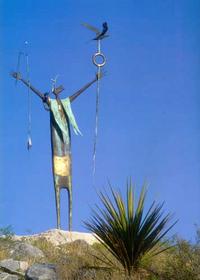 by Flemming Funch by Flemming Funch
Tom Atlee wrote a wonderful article about diversity. Tom is always an astute observer and thinker and collector of anything that might possibly help groups of people work better together, and tap their own co-intelligence.Diversity makes whole systems possible: You need diverse parts to make a bicycle. A barrel of handlebars won't do the job. Likewise, an ecosystem is made up of diverse species, making up complex food chains and cycles that keep the whole thing going.
Relationship, community, interdependence, mutuality -- even the entire economic system with all its different jobs and products and services and forms of exchange -- are all totally dependent on diversity.
As is freedom. Uniqueness is the inside face of diversity. If I want to "be myself" and "do things my way," I have to live in a culture that respects diversity. The more free a society, the more diversity it tends to generate. And that diversity tends to beget even more diversity as diverse people, stimulated by each other, find new ways to be unique...
Diversity is key to resilience. "Diversify," say the investment counsellors. If one variety fails, life can switch to another. This is the principle behind biodiversity: If all our corn is genetically identical, and a virulent bug attacks it, it may all be killed off. If our corn is genetically diverse, then some of it will succumb and some will survive. The survivors will reproduce, resulting in greater resistance to that bug. (Of course this natural selection process is busily at work on the bugs, too, so the dance goes on. But for any given species, its diversity -- and the diversity of the organisms and systems it depends on -- is a vital factor in its survival.)
If everyone depends on one mega-corporation for a monopolized product... If everyone uses the same operating system for their computers... If all the production facilities use the single most efficient form of production... If all the ferries are put out of business so all traffic must go on the bridges... If we all get our electricity from a single grid with no distributed local energy sources.... we make ourselves vulnerable to the collapse of the single things we all depend on. This is what freaked people out about Y2K, that it would knock out some basic central systems, triggering a catastrophic domino effect. This is a nightmare for terrorist emergency response planners, that terrorists could knock out some vital link in some technological system that we all depend on, for which there is no good alternative. Alternatives, diversity -- even redundance -- are key to resilience.
Diversity has many other roles, as well. Perhaps the most important is that it makes synergy dynamic. Three metal bars welded together into a triangle are stronger (more synergistic) than three metal bars welded into any other shape. That's why engineers use steel triangles to build bridges and industrial support structures. But that's static synergy. If you want to see dynamic synergy, check out the conversations between scientists like Albert Einstein and Neils Bohr, or any other people passionate about a subject, who have different views but share a dedication to finding greater truth. Since each sees things from a different perspective, they can see each other's blind spots and evolve together into bigger, clearer ways of seeing the world.
Or you can simply contemplate the synergy between your lungs and your heart, or between oxygen-breathing animals and carbon-dioxide breathing plants, or between musicians in a jazz combo, jamming... The synergy in all these cases is dynamic and alive, thanks to the diverse participants in the dance. There are possible negatives to diversity too, of course. At least apparent negatives. It is usually our differences that we use to oppress each other. So, what do we do about that? How do we focus on the healthy, creative diversity?Ultimately the creative use of diversity involves having some kind of common ground to stand on while exploring difficult differences. One of the most dependable forms of common ground is what I sometimes call our "core commons" -- that place in all of us that is rooted in our shared humanity, our shared aliveness, our shared spirit.
Whether through our own personal development, through good group process (helped perhaps by facilitators or mediators), or through fortunate religious or cultural conditioning, we may be able to see each other through our differences to the depths of our commonality. When this is done in healthy ways, it isn't done to deny our differences, but to maintain heartful, mindful pathways between us as we seek to understand our differences and their role in what comes next. We want our differences to make us powerful partners, not aliens and enemies.
Other forms of common ground include shared goals, visions, values, passions and purposes -- or shared crises that render all other factors miniscule in comparison. Shared history, culture and language can make it much easier to work through differences, as can being together in the same place. Nothing I can add, really. Read the whole article.
|
|
 by Flemming Funch
by Flemming Funch